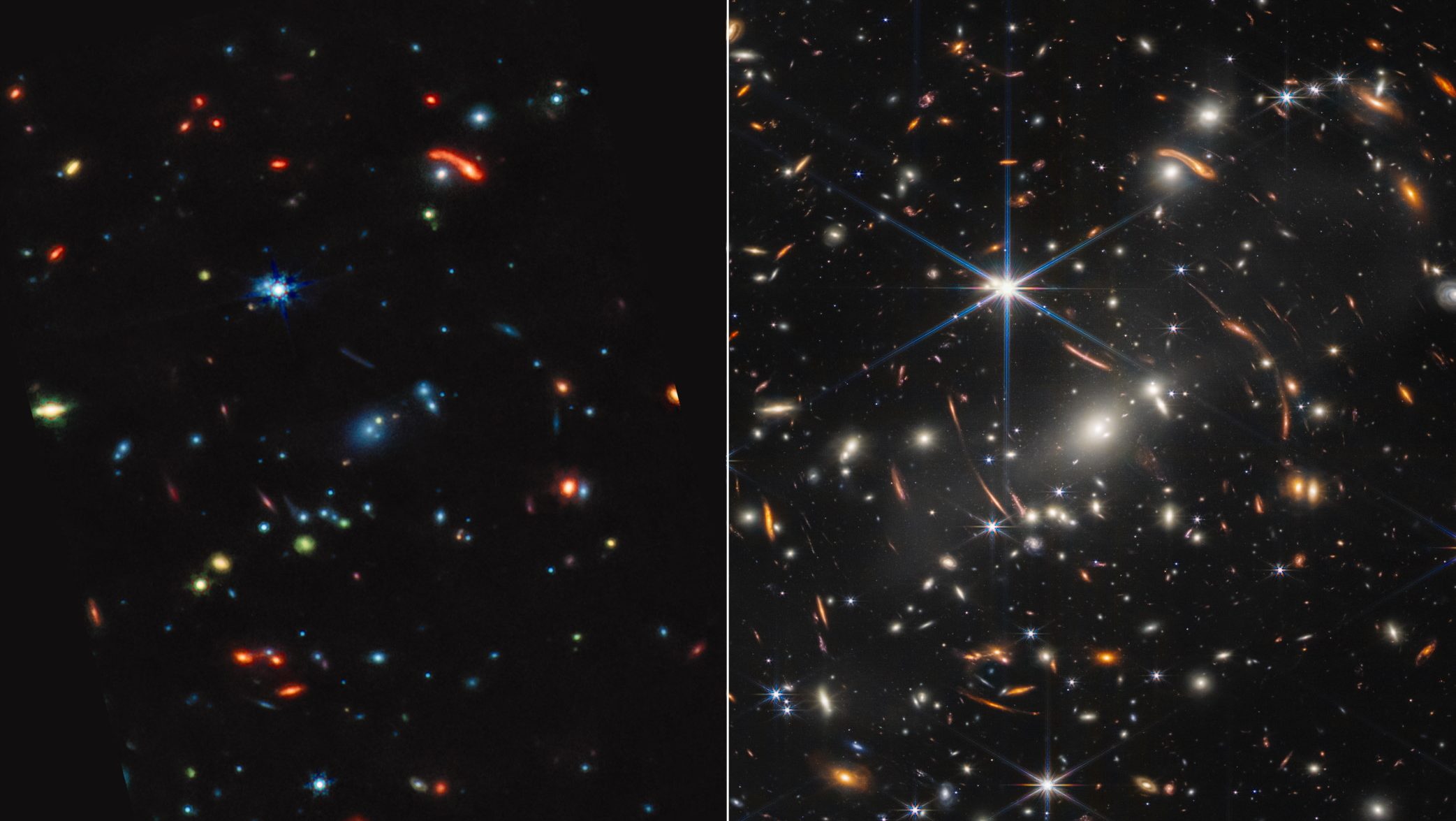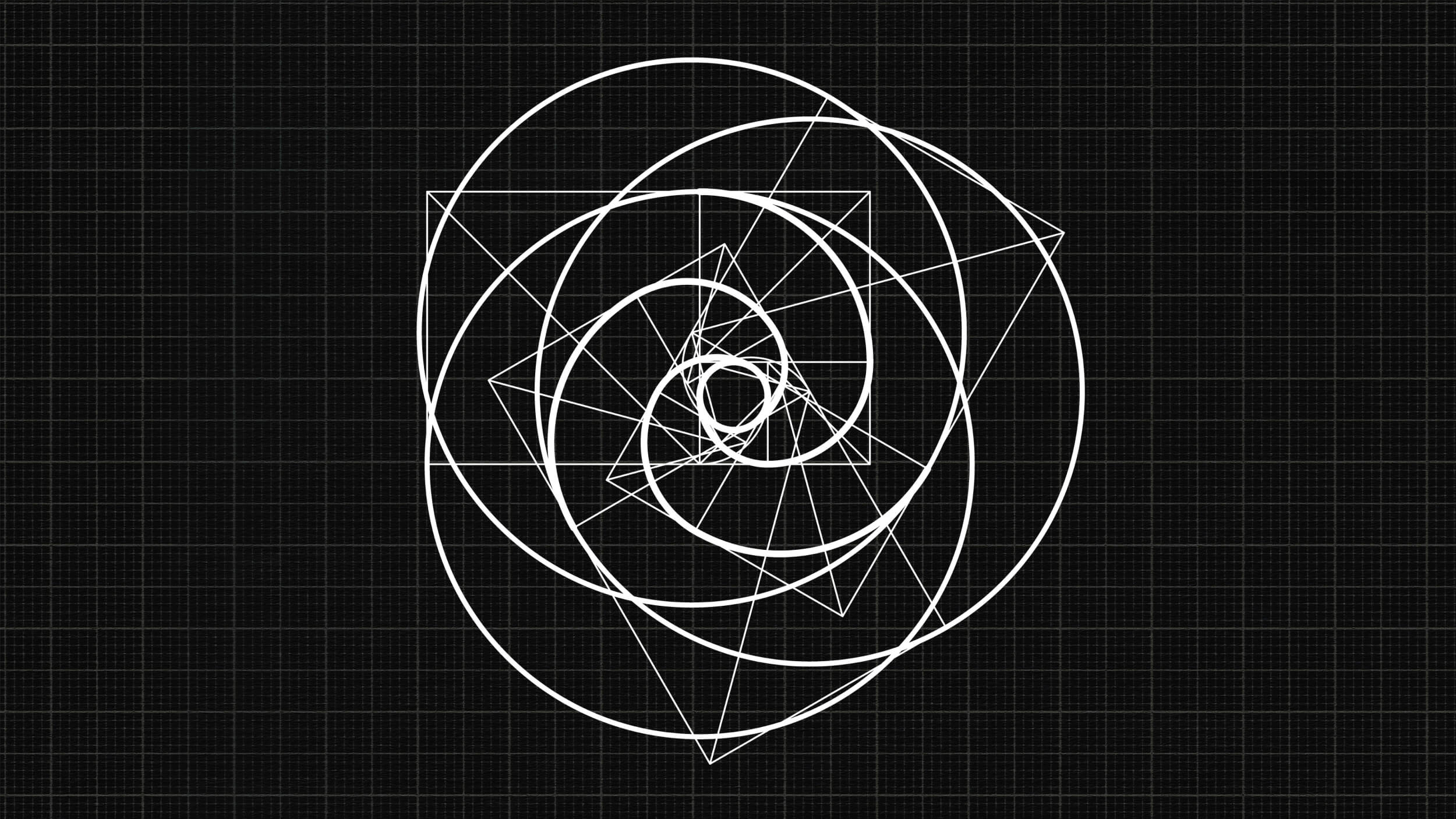Ask Ethan: The Multiverse And The Road Not Traveled
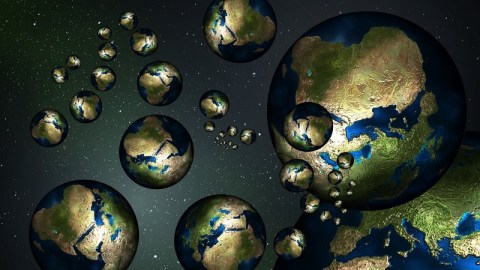
Is there an alternate Universe with a different version of you, and all the outcomes you didn’t choose?
“Go then, there are other worlds than these.” –Stephen King, The Dark Tower
The Multiverse is a word used by a great many people, yet not everyone means the same thing when they say it. Reader (and my former Lewis & Clark student!) Chris Olson wrote in and asked about two different meanings in particular:
In what way, if at all, are the ideas of Everettian Quantum Mechanics and Eternal Inflation related? Can we distinguish between the multiverse as implied by each?
There are a lot of different possibilities for what people might mean by “Multiverse” as opposed to Universe, so let’s go through them, starting from the least conservative (with the fewest new assumptions) and moving on through the increasingly more speculative.
1.) The Universe beyond what we can observe. When we speak of “the Universe,” we often mean the Universe that we can observe. Because the Universe that we know and recognize began with an event we know as the hot Big Bang — where a hot, dense, matter-and-radiation-filled Universe emerged and began expanding, cooling and collapsing into clumps under its own gravity — some 13.8 billion years ago, we’re fundamentally limited in terms of what we can see. Signals may have emerged at exactly that instant and traveled, unimpeded, at the speed of light through the constantly expanding Universe all that time, and yet there’s a finite distance that signal could’ve traveled. In our Universe with normal matter, dark matter, dark energy, neutrinos, radiation and all we know, that corresponds to a distance of 46.1 billion light years, centered on us.
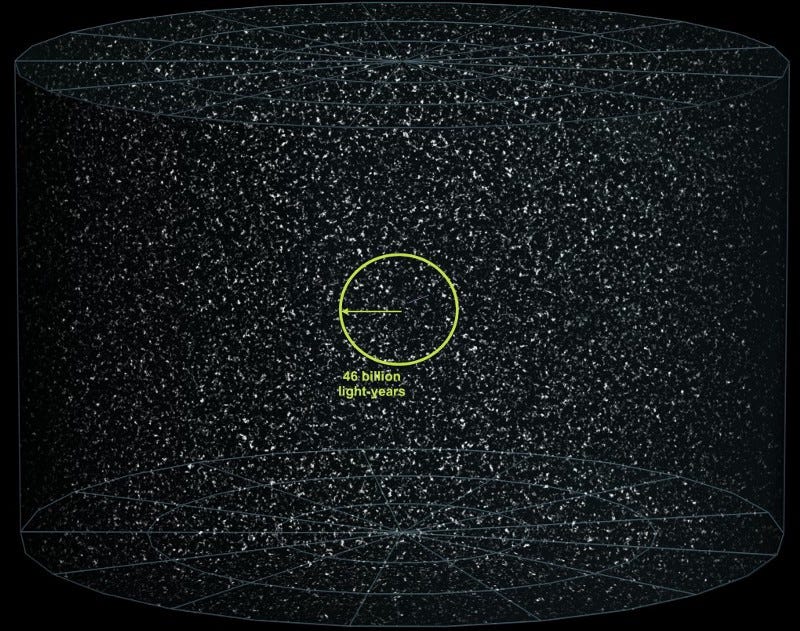
But there’s no reason to believe there isn’t plenty more Universe out there. There simply hasn’t been enough time for all of what we know as the unobservable Universe to reach us. As time continues to go on, more and more of the Universe will be revealed to us at our vantage point, even factoring in dark energy. But how much more is out there? Based on the observed curvature of the space we can observe, what exists compared to what we can see is at least 250 times as much in all dimensions, meaning the Universe has (250³) or over fifteen million times the volume of space (and stuff) that we can see. It’s possibly even infinite, although we don’t know for sure. However, that’s just the most conservative version of the Multiverse out there: more stuff like us. But there could be…
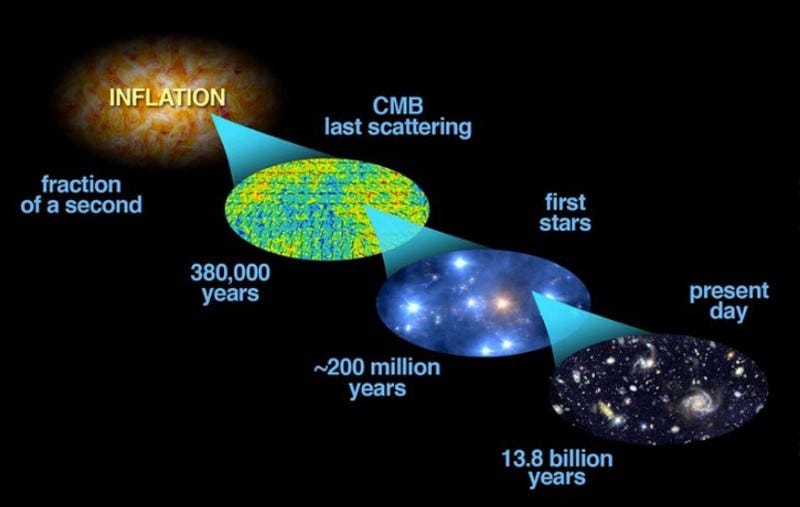
2.) Different “pockets” of Universe where inflation ends. The Big Bang might have been the beginning of what we know as “our” Universe, but it’s not possible (nor accurate) to extrapolate backwards to an arbitrarily hot, dense state. Instead, we know (from the cosmic microwave background) that the maximum temperature the Universe reached in the hot Big Bang was no greater than about 10³⁰ K. Now, that’s a huge number, but it’s not hot enough to reach the Planck scale, a singularity, or to cause the laws of physics as we know them to break down. One of the things it tells us is that there was something else prior to the Big Bang, consistent with what we perceive as the initial conditions to set it up: cosmic inflation. Inflation is basically a period in the Universe prior to the Big Bang that sets it up by making it:
- stretched flat,
- empty of all relic particles created prior to the end of inflation,
- with the same temperature and energy density everywhere,
- that contains a uniform spectrum of fluctuations.
Inflation is like a ball that rolls down a hill, only it’s a quantum ball, so there are probabilities in every location that it will (or won’t) roll down that hill.
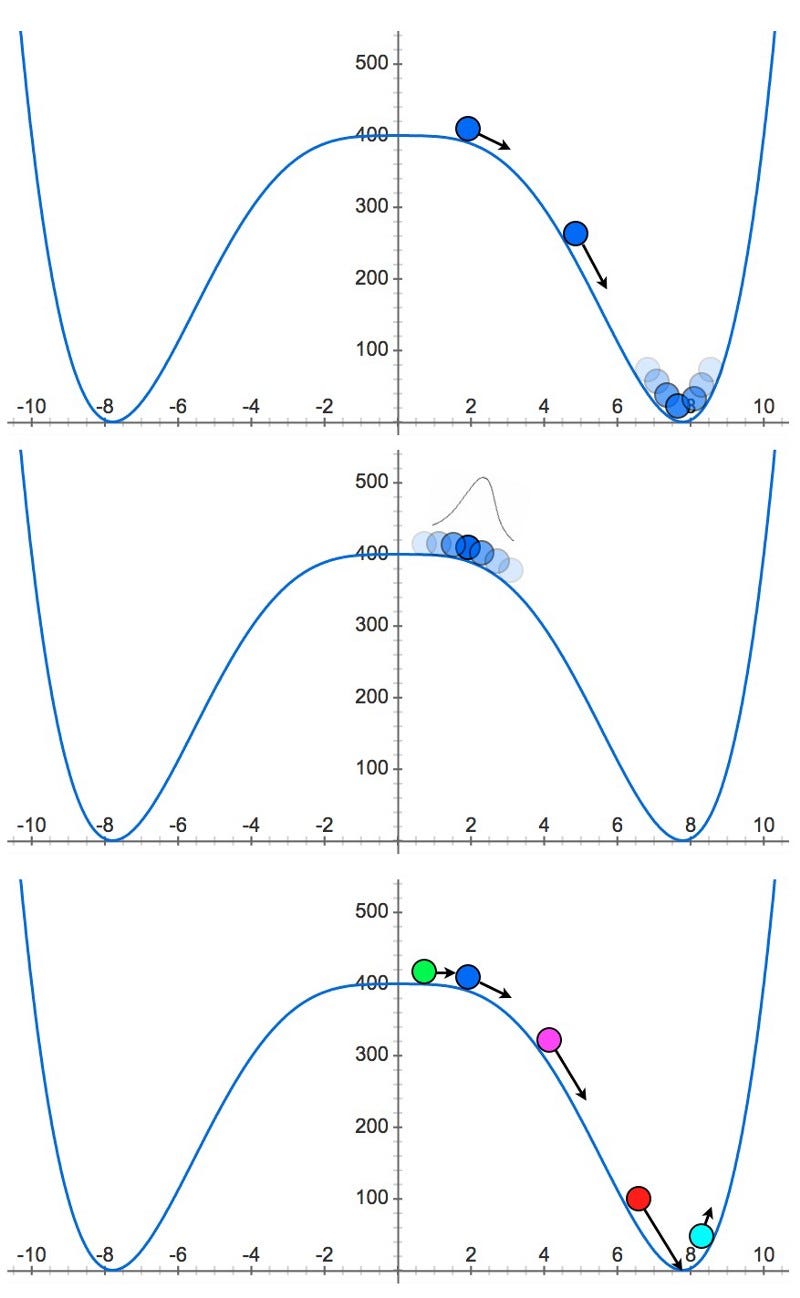
In the places where inflation stays atop the hill, not rolling down, inflation continues, creating more and more (inflating) space. Where it does roll down the hill, inflation comes to an end, creating the hot Big Bang. While inflation came to an end in our region of space some 13.8 billion years ago, it’s unreasonable to expect it came to an end everywhere. Instead, some regions of space will continue to inflate forever. So long as the rate at which space inflates is greater than the rate at which pockets of inflation come to an end (which it is in all working models), there will both be an infinite number of “Big Bangs” that are disconnected from one another, and also inflation will continue in the regions where it doesn’t end for an eternity into the future.
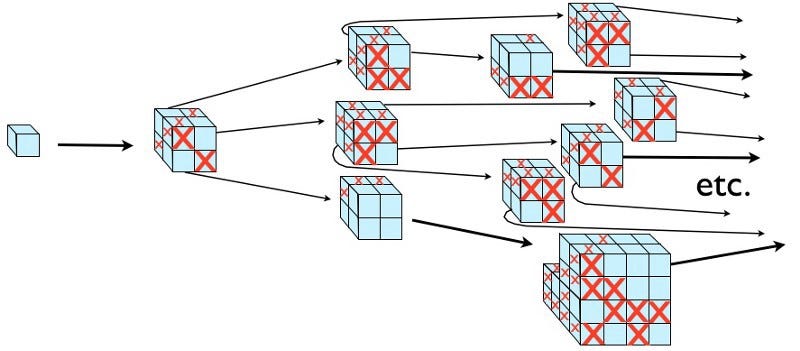
The red X’s, above, indicate regions (like ours) where inflation does end, but there are an infinite number of places where inflation comes to an end. This is an even larger “Multiverse” than the version of “more Universe beyond what we can see” given in #1. This is also the first of the Multiverses that Chris alludes to: the one given by eternal inflation.
3.) Different versions of you in different sections of the Multiverse. There are some 10⁹⁰ particles (including photons and neutrinos) in our observable Universe, all having undergone interactions and collisions with many other particles. They have positions and momenta, they have their own unique history, and some ~10²⁸ of them combine, right now, to make each and every one of us. If we take the expected rate of space’s expansion during inflation, and allow that most of space has been expanding at that rate for the entire history of our Universe (13.8 billion years), we can calculate how many possible Universes there are similar to our own.
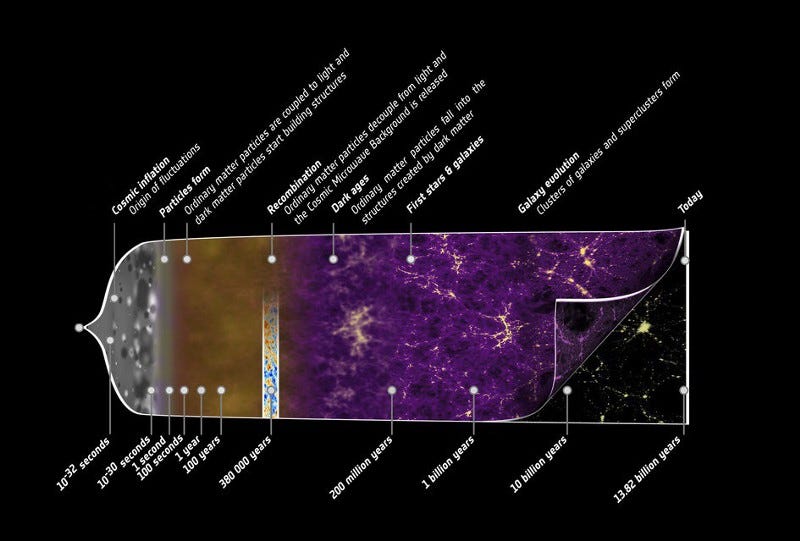
It’s a big number! Realistically, we’re talking about at least (10¹⁰)^50 Universes that started off with initial conditions that might be very similar to our own. That’s 10¹⁰⁰⁰⁰⁰⁰⁰⁰⁰⁰⁰⁰⁰⁰⁰⁰⁰⁰⁰⁰⁰⁰⁰⁰⁰⁰⁰⁰⁰⁰⁰⁰⁰⁰⁰⁰⁰⁰⁰⁰⁰⁰⁰⁰⁰⁰⁰⁰⁰⁰ Universes, which might be one of the biggest numbers you’ve ever imagined. And yet, there are numbers that are bigger that describe how many possible outcomes there are for particle interactions; remember, if you want to get an identical you, you need for the entire Universe’s history to have unfolded the exact same way ours did, up until you decided one way or the other to:
- take that job,
- buy that house,
- kiss the person you like,
or whatever other decision you did (or didn’t) make.
Our Universe has a lot of particles in it: about 10⁹⁰. Every time two particles interact, there’s not just one possible outcome, but an entire quantum spectrum of outcomes. As sad as the case is, there are way more than (10⁹⁰)! possible outcomes for the particles in the Universe, and that number is many googolplexes times larger than a paltry number like (10¹⁰)^50. In other words, the number of possible outcomes from particles in any Universe interacting with one another tends towards infinity faster than the number of possible Universes increases due to inflation. You would have needed inflation to have been going on literally forever before our Big Bang for this to be possible, and that would violate the Borde-Guth-Vilenkin singularity theorem, which shows that inflation cannot be past-timelike complete. In other words, this one seems unlikely.

4.) Entangled versions of you in different pocket Universes. This reaches for the second part of Chris’ question: the part about Everettian quantum mechanics. Assuming that option 3 is true, and that there are other versions of you in other pockets of the Multiverse, are they entangled? Quantum physics is open to interpretation, meaning that there are a number of different approaches to it (or ways of looking at it) that give the same answers. Quantum systems can either have wavefunctions that spread out over time and instantaneously collapse when an interaction occurs, for instance, or can have an ensemble of possible outcomes that one is selected from as we go down that path. Hugh Everett’s interpretation — the Many-Worlds Interpretation of quantum mechanics — holds that there are an infinite number of parallel Universes out there, and whenever a decision is made, we go down some of those paths and not others. So there are Universes out there where you did (and didn’t) take that job, where you did (and didn’t) buy that house, and where you did (and didn’t) kiss your love interest at the critical moment, among others.
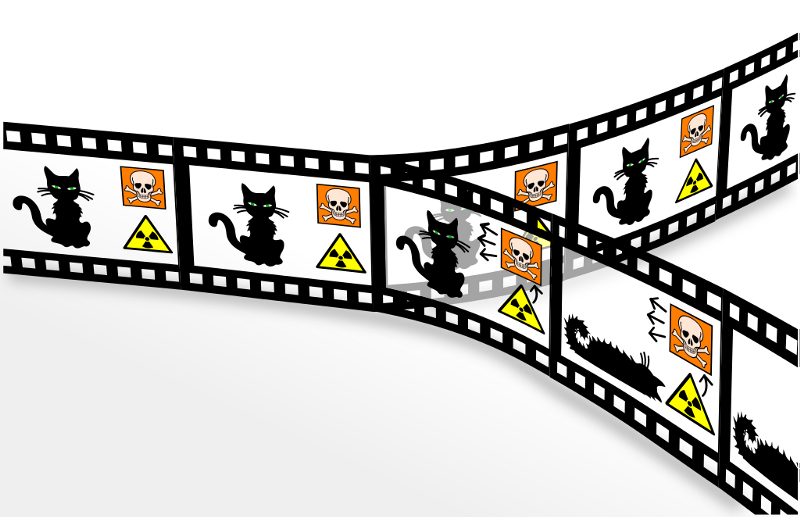
Even if a truly infinite number of Universes did exist, there is no way to create an entanglement between them that’s clear, although that doesn’t stop people from speculating. This is another untestable possibility, and one that requires a number of quite extraordinary assumptions. Yet, we can go even further down the Multiverse rabbit-hole, if we want.
5.) Different Universes with different laws of physics. This is an even more highly speculative one, predicated on an assumption: that when inflation ends, there are multiple ways for it to end, resulting in different laws of physics and/or fundamental constants from the Universe we presently inhabit. This would be a Multiverse where some pockets of it recollapse, others expand so rapidly that no stars or galaxies ever form; where some have no dark matter and others have all dark matter; where some have bigger or smaller or even negative cosmological constants. There may even be Universes out there that have entirely different particles and interactions from our own. There is no way to test this.

From what we can observe, we are pretty sure that option 1 is true: there is more Universe out there than what we can see. From what we know of inflation, we’re pretty sure option 2 is also true: there are regions of space outside of our Universe where inflation ended at different times, each with their own hot Big Bangs, as well as regions where inflation is still ongoing, and where it will go on eternally into the future. And from what we know of different infinities, we’re pretty sure that number 3 isn’t true, and hence option four cannot be true either. Option five? Many entertain this, but there’s no evidence for it, it’s not testable, and the fact that inflation ends well below the Planck scale gives us serious reasons to doubt that this is even possible. (Yet many will continue to entertain it without ever giving this a second thought.) The Multiverse is almost definitely real beyond any reasonable doubt, but what version of the Multiverse you subscribe to makes all the difference in the Universe.
Submit your questions and suggestions for the next Ask Ethan here!
Leave your comments on our forum, and check out our first book: Beyond The Galaxy, available now, as well as our reward-rich Patreon campaign!

